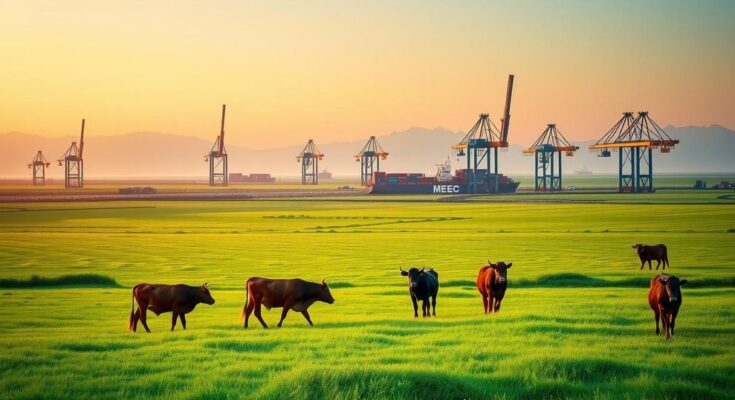Argentina’s beef exports will see China acquiring 70%, with cuts in U.S. cattle inventory creating competitive pressures. New policies under President Milei aim to bolster economic growth through deregulated cattle exports. The increase in Argentina’s beef production contrasts starkly with rising U.S. beef prices due to inventory declines.
China is set to purchase 70% of Argentina’s beef exports, including live cattle, amidst a reduction in U.S. cattle inventory. Argentine President Javier Milei has announced that ranchers can now export live cattle for slaughter, reversing a ban that had been in place for 52 years. This decision is aimed at fostering competition in the meat and livestock sector to stimulate economic growth within Argentina, the second-largest economy in South America.
According to the Argentine agriculture secretariat, 29.4% of beef production in 2024 will be exported to 53 countries, a notable increase in trade partners compared to previous years. China remains the dominant importer, accounting for nearly 70% of Argentina’s beef exports, while other significant buyers include the European Union, Israel, and the United States.
In 2024, Argentina has experienced a 10% increase in beef exports, totaling over 935,000 metric tons, the highest since 1924. Comparatively, the U.S. exported 1.29 million metric tons, with South Korea as its largest buyer. U.S. cattle inventory has been declining, with reports indicating an overall decrease of 2% in herds from the previous year, reaching the lowest levels since 1951.
Factors contributing to higher American beef prices include decreased cattle herd sizes due to rising operational costs. As a result, current beef prices in Argentina range from $2.19 to $3.11 per pound, while U.S. ground beef averages $5.55 per pound. USDA statistics reveal a steady decline in U.S. cattle numbers, underlining the challenges faced by American farmers and ranchers regarding cost competition.
Furthermore, the article includes information about Elon Musk’s involvement at a political gathering, which coincides with developments in the beef trade. Reports indicate emerging tensions in the agricultural sector as policies and trade dynamics shift between nations, continuously reshaping the landscape of global agriculture.
In conclusion, the anticipated surge in China’s purchase of Argentine beef highlights significant shifts in global trade relations and agricultural policies. Argentina’s lifting of the cattle export ban represents a strategic move towards enhancing its competitive position in the international market. Meanwhile, declining U.S. cattle stocks and rising prices may influence domestic agricultural sustainability and consumer costs.
Original Source: www.newsbreak.com




